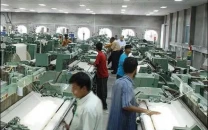Therapy Industrial Complex
‘Mental health crisis’ represents a symptom: the underlying ‘disease’ is an economic system designed to exploit

Mental health has expanded by leaps and bounds over the past century or so, with the ‘psychological’ slowly establishing itself on a par with the ‘physical’ in medical practice across the globe. While there can be no denying the importance of departing from pure superstition when it comes to addressing ailments such as anxiety and depression, it would not be an exaggeration to claim that the mental health arena has gradually morphed into a tool for control: individualising societal-level problems via an intricate combination of ideology, ‘talk therapy’ and psychiatric medication.
At its most fundamental level, the problems plaguing the mental health arena are not much different from those of the broader privatised healthcare system: perverse incentive structures. Patients are not consulted with the objective of delivering swift, sustainable solutions to their particular problems but to prompt them to return periodically for further check-ups, counselling, and prescriptions. This makes perfect sense in a context that frames vulnerable individuals as revenue-generating customers who can be tasked to take pills that might offer temporary relief but which induce dependencies: turning them into life-long returnees to the pharmacy.
This works out well for parallel industries, such as insurance, that can expect regular inflows of subscriptions as mental illness becomes increasingly prevalent. In terms of its internal dynamics, mental health practitioners tend to promote a narcissistic fixation on the self: whereby the ‘original source’ of all troubles is always located within the deep recesses of the psyche. This comes in various forms, including unresolved traumas, sexual repression, identity confusion, and more. The messaging here is simple: in order to attain ‘happiness’, correct your interpretation of external events.
A kind of ‘CEO of the self’ approach is thus promoted, despite the fact that it is far from self-evident that human beings even have the sort of autonomy over their cognitive/sensory faculties that would allow for that level of ‘authorship’. Nevertheless, the idea of ‘managing oneself’ lies at the core of this ideology, functioning to quell dissent, resistance, and accountability at a political level. Another fascinating angle to this phenomenon is its insistence on ‘normalising’ mental health illness — a harmless, even noble, idea at the outset meant to eliminate stigmas, but one that takes on peculiar manifestations in practice.
Entire ‘subcultures’, for instance, seem to be thriving on the internet: whereby young individuals romanticise their psychological troubles — sharing memes, blogs, and artwork with one another in a shared experience. ‘Pillcore’, for instance, is an online community constituting visuals of medication, usually presented in an aesthetically pleasing manner using a variety of colours and patterns. ‘Weirdcore’ contains random assortments of low-quality visuals generally depicting feels of despair and bewilderment.
‘Traumacore’ revolves around themes of abuse, combined with ‘cute’ imagery that purportedly takes the ‘edge’ off the content. Naturally this is an entire industry in itself, whereby the material is printed on cups, badges, stickers, t-shirts, socks, caps, and more — marketed to individuals that spend time in certain kinds of online communities via targeted ads, which they then purchase and post pictures of, thus prompting others to jump onto the bandwagon in a vicious cycle.
What started as a medical condition has thus transformed into an elaborately commodified system — with particular rituals, traditions, languages, etc — functioning to grant its participants a sense of ‘grounding’ and keep them docile by preventing or downplaying real world concerns. Psychological disorders are undoubtedly real, legitimate, and worthy of careful attention: but they are the by-product of societal structures and governance arrangements rather than the shifting chemistry of the brain.
Nothing could quite be more convenient for incompetent, opportunistic ruling elites than subjects that are convinced that they are their own biggest enemies. The ‘mental health crisis’ represents a symptom: the underlying ‘disease’ is an economic system designed to exploit, divide, and alienate.












1726134115-0/BeFunk_-(41)1726134115-0-208x130.webp)



COMMENTS
Comments are moderated and generally will be posted if they are on-topic and not abusive.
For more information, please see our Comments FAQ